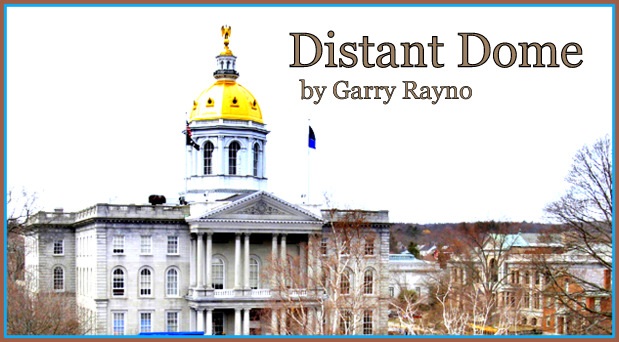InDepthNH.org and Manchester Ink Link co-publish Garry Rayno’s column Distant Dome about what goes on behind the scenes at the State House.
By GARRY RAYNO,
Distant Dome
CONCORD – For the first time in 14 years, New Hampshire has a wholly Republican budget, crafted by the GOP-controlled Senate and House and the party’s first governor since 2004.

Garry Rayno
Although the House (not so much this year) and Senate do the heavy lifting on most budgets introduced by governors, usually about 75 to 80 percent of what is in it is exactly what the state’s chief executive and his budget staff propose.
It is the controversial issues that require the work.
Even in 2011 when the GOP held veto-proof majorities in the House and Senate and made major changes in the budget then-Gov. John Lynch submitted, most of his work remained unchanged.
Funds cut
The lawmakers that year slashed funding for higher education by half, eliminated some social service programs like Children in Need of Services and kept a good amount of the Medicaid Enhancement Tax collected on hospital services for the general fund instead of returning the proceeds to the hospitals after the money was used to match federal funds.

Former Gov. John Lynch, D-NH
Those were significant changes to Lynch’s budget, but the nuts and bolts line items for most departments changed little if any by GOP budget writers that year.
So what’s the big deal about an all-Republican budget? For the first time in those 14 years, a Republican chief executive will be managing the state’s spending and not a Democrat.
While Republican-controlled legislatures revised budgets that were passed into law, Democratic governors had control over how the money is spent if it is spent at all.
Say for example, the GOP legislature wants to begin a new program to help businesses with overseas marketing, but the governor does not believe the program will do any good.
The executive branch takes its time to implement the program and never does hire anyone to run it and then the biennium is over and only a few hundred dollars is spent and not the $250,000 lawmakers intended.
The Democratically controlled executive branch also decides who wins contracts with the state and for how much, which can save money or go way over budget if the legislature grossly underfunded a program like it did Medicaid two years ago.
But lawmakers can also use their work on the budget to score political points against a governor from the opposing party.

Former governor and now U.S. Sen. Maggie Hassan, a Democrat
Last year Republican lawmakers complained that then-Gov. Maggie Hassan was slow to roll out money they approved that spring to fight the state’s drug addiction crisis although many of the programs were not yet in place nor were there enough providers to do the work.
Budget Win
This $11.7 billion biennial budget approved this week by lawmakers is a big win for new Gov. Chris Sununu considering the House failed to approve a budget this spring proposed by its Finance Committee because 30 to 40 Republicans — mostly from the House Freedom Caucus — believed it spent too much money and joined Democrats, who believed it failed to fund essential services, to kill it.

Gov. Chris Sununu
The budget approved this week does have much of what the new governor wanted, full-day kindergarten, an overhaul of the Division of Children, Youth and Families, more money for the state’s mental health system, additional money for service providers, fighting the opioid addiction epidemic and using surplus money from this biennium’s budget for state and local highway projects and school building aid.
However, some of his priorities did not receive all the money he would have liked.
There are some things that make it a truly Republican budget like the rate decreases for the business profits and business enterprise taxes — not a priority of the state’s largest business organization the Business and Industry Association — eliminating the electric consumption tax, limiting business enterprise tax revenues to the education trust fund, adding a work requirement for expanded Medicaid recipients although it was shot down under the Obama administration, and pouring about $100 million in the state’s Rainy Day Fund.
And there are some things in the budget only Republicans could do — because if Democrats proposed them they would be accused of growing government — like upping the earnings threshold for welfare, adding child protection workers and increasing the salaries of direct care providers.
This budget also reflects changing views on public education as more money is appropriated for charter schools, while less money goes into stabilization grants to school districts, many on the low end of the property-value scale.
Budget writers provided a little more money for the community college system, but flat funded the university system almost guaranteeing tuition will increase once again.
KENO kindergarten
The funding for providing full-day kindergarten is from KENO or gambling revenue, not what most economists would call a stable revenue source.
The Republican leadership make this a wholly Republican budget. All the adjustments made in the budget once it left the governor’s desk in February and the House in April appealed to the Freedom caucus and the Republican House Alliance.
And the votes reflect that as the budget compromise passed the Senate on a party-line vote of 14 Republicans in favor and nine Democrats opposed.
The House vote was similar with only five Democrats in favor and 14 Republicans against it, mostly from the freedom caucus.
The same fiercely partisan legislative battles going on in Washington are coming home to the New Hampshire legislature.
And in the same fashion, national issues are finding their way into the New Hampshire budget as well. The $11.7 billion spending plan included a provision similar to the Hyde amendment, which prohibits state funds from going to reproductive health facilities to pay for abortions.
And the budget includes a work requirement for expanded Medicaid recipients or the program will end.
The greatest impact from this budget will come several years down the road when the business tax cuts begin to take a big bite out of state revenues heading toward the $100 million mark.
$80 Million Surplus
Right now the state has more money than it needs which is why Sununu created a special fund with the projected $80 million surplus.
There is plenty of money to do the things Democrats would have wanted in return for their support like additional money for higher education, more DCYF workers, greater funding for addiction treatment and recovery programs, and workforce training, but Republicans did not do that.
Republicans have not had full control of the State House for 14 years and now they do.
The next 18 months will reveal if the GOP still knows how to govern or if there will be more roadblocks like the House’s failure to pass its version of the budget in April.
Divided government has been the norm in New Hampshire for 14 years. Now Republicans are in control and it’s up to the GOP to deliver.
Garry Rayno can be reached at  Garry Rayno’s Distant Dome runs exclusively on Manchester Ink Link and InDepthNH.org, where Rayno will explore a broader perspective on State House – and state – happenings. Over his three-decade career Rayno has closely covered the NH State House for the New Hampshire Union Leader and Foster’s Daily Democrat, and his coverage spanned the news spectrum, from local planning, school and select boards, to national issues such as electric industry deregulation and Presidential primaries. He is former editor of The Hillsboro Messenger and Assistant Editor of The Argus-Champion. Rayno graduated from the University of New Hampshire with a BA in English Literature and lives with his wife Carolyn in New London.
Garry Rayno’s Distant Dome runs exclusively on Manchester Ink Link and InDepthNH.org, where Rayno will explore a broader perspective on State House – and state – happenings. Over his three-decade career Rayno has closely covered the NH State House for the New Hampshire Union Leader and Foster’s Daily Democrat, and his coverage spanned the news spectrum, from local planning, school and select boards, to national issues such as electric industry deregulation and Presidential primaries. He is former editor of The Hillsboro Messenger and Assistant Editor of The Argus-Champion. Rayno graduated from the University of New Hampshire with a BA in English Literature and lives with his wife Carolyn in New London.





